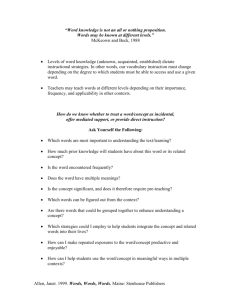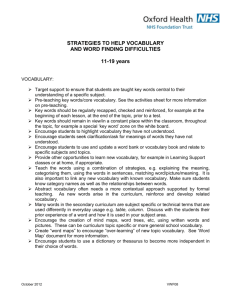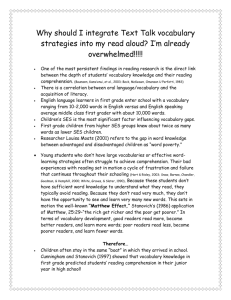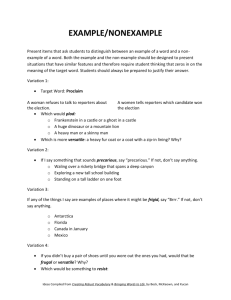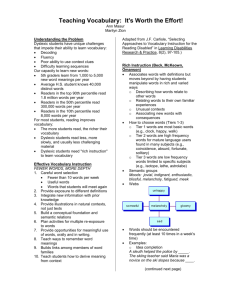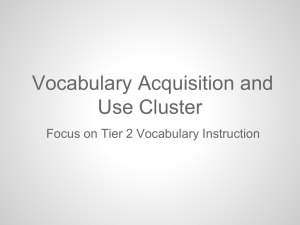Vocabulary- Pre-teaching - NSW Centre for Effective Reading
advertisement
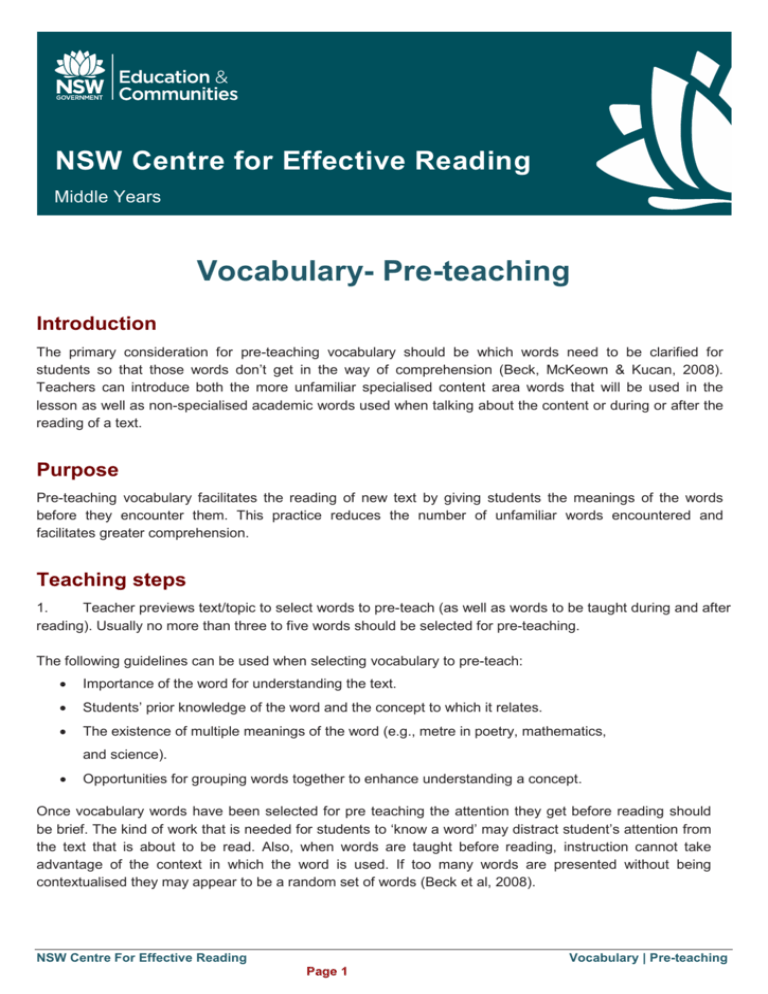
NSW Centre for Effective Reading Middle Years Vocabulary- Pre-teaching Introduction The primary consideration for pre-teaching vocabulary should be which words need to be clarified for students so that those words don’t get in the way of comprehension (Beck, McKeown & Kucan, 2008). Teachers can introduce both the more unfamiliar specialised content area words that will be used in the lesson as well as non-specialised academic words used when talking about the content or during or after the reading of a text. Purpose Pre-teaching vocabulary facilitates the reading of new text by giving students the meanings of the words before they encounter them. This practice reduces the number of unfamiliar words encountered and facilitates greater comprehension. Teaching steps 1. Teacher previews text/topic to select words to pre-teach (as well as words to be taught during and after reading). Usually no more than three to five words should be selected for pre-teaching. The following guidelines can be used when selecting vocabulary to pre-teach: • Importance of the word for understanding the text. • Students’ prior knowledge of the word and the concept to which it relates. • The existence of multiple meanings of the word (e.g., metre in poetry, mathematics, and science). • Opportunities for grouping words together to enhance understanding a concept. Once vocabulary words have been selected for pre teaching the attention they get before reading should be brief. The kind of work that is needed for students to ‘know a word’ may distract student’s attention from the text that is about to be read. Also, when words are taught before reading, instruction cannot take advantage of the context in which the word is used. If too many words are presented without being contextualised they may appear to be a random set of words (Beck et al, 2008). NSW Centre For Effective Reading Vocabulary | Pre-teaching Page 1 2. Pronounce the word if the pronunciation is difficult. 3. Provide the word’s meaning through a student friendly definition (Beck & McKeown, 2002). Think about how the word is typically used and provide a meaning in everyday language. Dictionary definitions are not always helpful in providing a clear definition of a word for students. For example: Target Word Dictionary definition Student friendly definition devious straying from the straight course; not straightforward If someone is devious, he is using tricky and secretive ways to do something dishonest. vicarious felt by sharing in others’ experiences jaded worn out; tired; weary exotic foreign; strange; not native If someone is getting a vicarious feeling, she is sharing an experience by watching or reading about it. If someone is jaded, he has done or has seen so much of something that he begins to dislike it. Something that is exotic is unusual and interesting because it comes from another country far away. Beck, McKeown & Kucan (2008) 4. Use the word in a sentence to clarify the meaning in context. Target word devious Sentence Steven was devious when he told his friends different reasons for the lost ball. Sally had vicarious pleasure in watching a video of the concert she could not attend because she was sick. We had both become jaded, disinterested and disillusioned. vicarious jaded exotic She looked very exotic in the brightly coloured dress bought when she was overseas. 5. Read the text and clarify words that have been the focus of pre-teaching if necessary. Technology Tip The following on online dictionaries provide student friendly definitions of words. http://dictionary.reverso.net/english-cobuild/ http://www.merriam-webster.com/ NSW Centre For Effective Reading Vocabulary | Pre-teaching Page 2 References Beck, I.L. & McKeown, M.G. (2002). Bringing words to life: Robust vocabulary instruction, The Guilford Press:NY. Beck, I.L., McKeown, M.G. & Kucan, L. (2008). Creating Robust Vocabulary: Frequently asked questions and extended examples. The Guilford Press: NY. NSW Centre For Effective Reading Vocabulary | Pre-teaching Page 3
